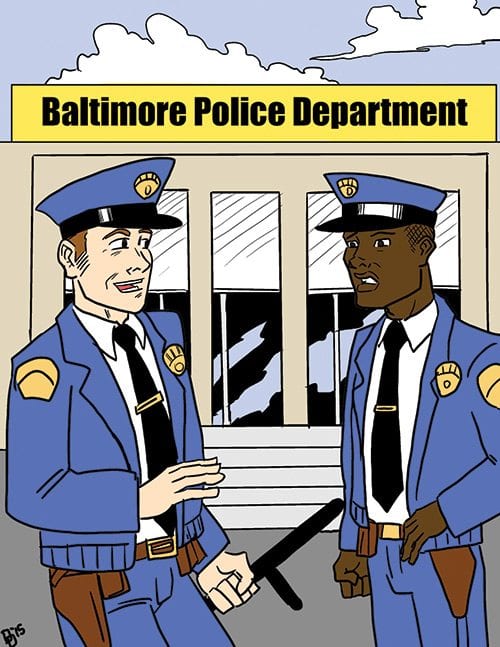
In a despotic government, the criminal justice system provides a means for those in power to enhance their authority by subjugating the people. Consequently, a prerequisite of democracy is the requirement of equality for all before the law. In defiance of that standard, the U.S. criminal justice system has been abusive of blacks for decades, and that is one of the reasons for the Freddie Gray rebellion in Baltimore.
The citizen’s first contact with law enforcement is with the police. Prior to 1968, the police had no authority to stop and frisk a citizen unless they had probable cause to make an arrest. Then in the case of Terry v. Ohio, the U.S. Supreme Court gave the police the authorization to pat down anyone reasonably suspected of being armed.
This open door led to the erosion of individual rights. In New York City, where records were kept, the annual number of stop and frisks climbed to 685,724 in 2011. Of that number, 53 percent of the victims were black and 34 percent were Latinos. More than half were youth between the ages of 14-24. With the change in municipal government in New York, the number of stop and frisks has declined. However, that invasion of personal rights is common across the country.
It is humiliating and embarrassing to be stopped by a policeman and required to raise your arms to facilitate a personal search. At least when the incident is over the citizen can walk away. The African American males who are arrested, tried and convicted, then sentenced to lengthy jail terms, are not so fortunate.
According to a 2013 report by the Sentencing Project of Washington, D.C., “African American males are six times more likely to be incarcerated than white males and 2.5 times more likely than Hispanic males. If current trends continue, one of every three black American males born today can expect to go to prison in his lifetime…” To many conservatives, this is a natural reflection of their erroneous perception of the greater criminality in the black community.
The so-called “war on drugs” has seen an enormous growth in imprisonment for drug violations. That population has grown from 41,000 in 1980 to almost a half-million in 2007. While African Americans were on average only 13 percent of drug users from 1999-2005, they constituted 46 percent of those convicted for drug violations. In fact the National Institute on Drug Abuse published a 2012 study that found that white students were more likely to have used illegal drugs, yet black youth were arrested for the offense at twice the rate of whites.
Black residents of Baltimore are certainly aware of the “driving while black” phenomenon. Studies indicate that the incidence of traffic stops and fines against black drivers are disproportionate. This is just another form of racially discriminatory law enforcement. According to the 2010 U.S. Census, blacks are overrepresented in Maryland prisons and jails. While blacks are 29 percent of the state’s residents, they constitute 68 percent of the incarcerated population.
The death of Freddie Gray while in the custody of the Baltimore police has triggered violence in the city, but there is certainly an extended history of racial discrimination in law enforcement across the country that is sufficient to foment such a response. Blacks in Baltimore are also aware of the deaths of Walter Scott, Michael Brown, Eric Garner and Trayvon Martin. Under the circumstances, the violence of the popular response in Baltimore could have been even greater.






